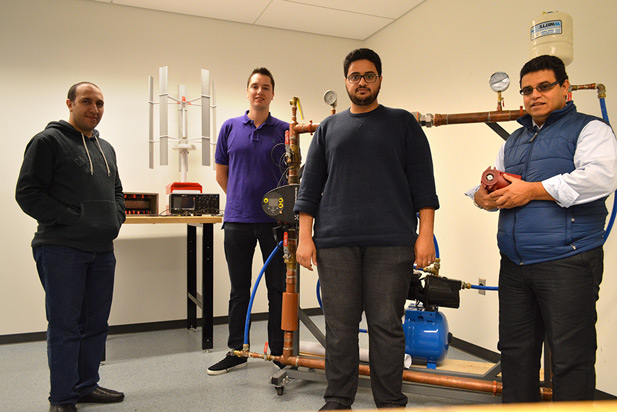Water is life: Engineering researcher pumped about the future
Dr. Mohamed Youssef aims to pioneer more-efficient water pumps
October 14, 2016

For years, scientists and environmentalists have been saying the most important commodity of the 21st century around the world will be water.
In some parts of the globe, freshwater demand exceeds available supplies. But in other areas where water remains abundant, it is often a poorly managed resource.
“Water is life, and the need for efficient management of water has never been more urgent,” Dr. Mohamed Youssef, Assistant Professor, Faculty of Engineering and Applied Science. “We need to remember that our water supply is not limitless. Managing water is more than just about simple conservation though. Our aging infrastructure was built at a time that did not take into consideration the level of power consumption and water usage we see today.”
Through research funding support from the Natural Sciences and Research Council of Canada, Dr. Youssef plans to make the the University of Ontario Institute of Technology the new powerhouse of water pump smart drive research in Ontario and Canada. One of his research areas is the application of power electronics in smart drives for renewable energy resources and transportation electrification. In simple terms, he is working with industry partners to build better water pumps that are long-lasting and use far less energy than traditional motors.
One of Dr. Youssef’s research collaborations with one of the world’s leading water pump manufacturers saw the industry partner upgrade the boosting system at Toronto General Hospital in 2014. The company replaced the hospital’s aging 100-horsepower (HP) system with a 45-HP system. TGH has cut water pump power consumption by more than 50 per cent and dramatically cut water use.
“You can imagine the implications if we were able to extend such water pump energy efficiency to households,” says Dr. Youssef. “Historically, water pumps have featured inefficient induction motors. Our research goal is to develop cost-effective water pumps that use energy-efficient motors. Everybody wins with lower energy bills and reduced water consumption.”
Dr. Youssef also collaborated with another leading Canadian water pump manufacturer on a new family of smart water pumps. The design allows for pumps to be monitored, diagnosed and troubleshot remotely using an Internet-based diagnostics tool.
New water pump research on tap
In the summer of 2016, Dr. Youssef received further research funding in collaboration with his industrial research partners. This funding, combined with equipment contributions from water pump companies, has helped established the FEAS Power Electronics and Drives Applications Lab (PEDAL) at the university.
“We are pioneering new water pump prototypes that meet and exceed the updated efficiency standards unveiled earlier this year by the United States Department of Energy,” explains Dr. Youssef. “We want to develop new motors and controllers that can be quickly integrated for commercialization. The future is now.”
Did you know?
Some examples of where efficient water pumps are needed:
- agriculture/irrigation
- automotive industry (electric and hybrid vehicles contain up to 10 pumps)
- cooling/heating buildings
- cooling nuclear reactors
- domestic water usage
- drinking water
- hydroelectricity
- sewage/waste treatment
- solar-power based pumps for rural areas in developing countries
Media contact
Bryan Oliver
Communications and Marketing
Ontario Tech University
905.721.8668 ext. 6709
bryan.oliver@ontariotechu.ca



